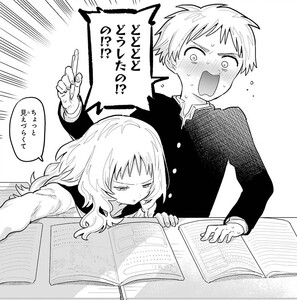Difficult to do with 〜づらい
Grammar: Difficulty » 〜づらい
To express that an action is difficult, the auxiliary adjective may be づらい is appended to the verb stem.
Properties of づらい as an auxiliary adjective include:
- Used with verbs that involve intention.
- Action can be accomplished, but requires hard work to do so (has obstacles to overcome).
- More subjective to the person doing the task than にくい and がたい.
Further Reading
- Describing actions as easy or hard - Tae Kim's Japanese grammar guide (guidetojapanese.org)
Examples
Difficult to meet up with 〜づらい

After recovering from over-dieting, Miku quickly gained back the weight she had lost. She receives a text message from her boyfriend, Shibutani, about scheduling time to meet up between their summer classes, but she turns him down.
- みく:
- 「ごめんね渋谷」
- “I'm sorry, Shibutani.”
- 「なんかやっぱり会いづらい…」
- “It's still difficultto meet with you...”
- 「また太っちゃって」
- “I've put on weight again...”
Difficult to say with 〜づらい

Takeo feels Rinko is keeping something from him, but can’t figure out what. Makoto and Ai meet with Rinko to confront her about it.
- 愛:
- 「言って! 猛男に言づらいんでしょ? 猛男に言わないから!」
- “Tell me! It's difficultto say to Takeo, right? But I won't tell Takeo!”
- 誠:
- 「絶対言う…」
- “She'll definitely tell him...”
Difficult to see the text with 〜づらい

Komura shares his history book with Mie. Since Mie forgot her glasses, she leans in as she strains to see the material written in the book.
- 小村:
- 「どどどど どうしたの!? の!?!?」
- “Wh-wh-what's wrong?!”
- 三重:
- 「ちょっと見えづらくて」
- “It's a bit difficultto see...”